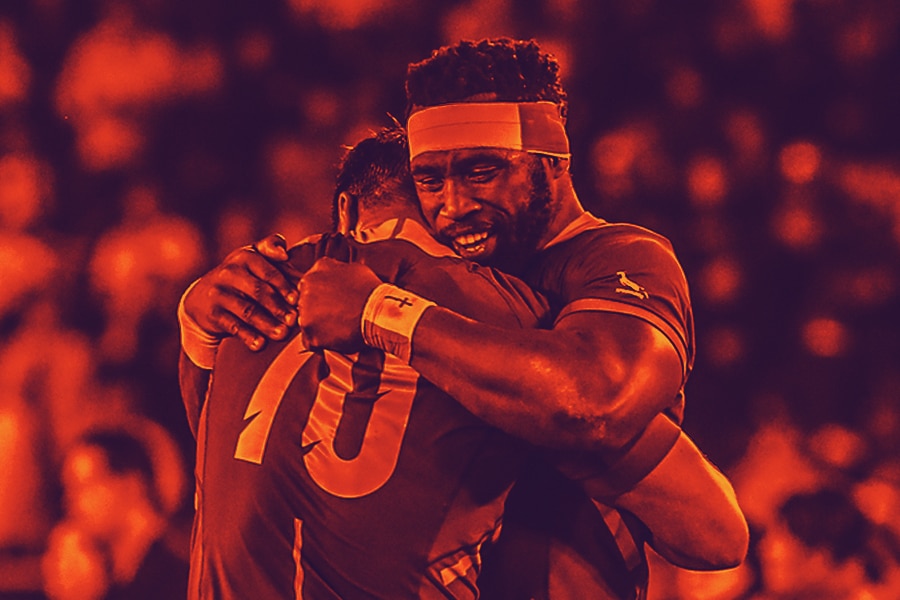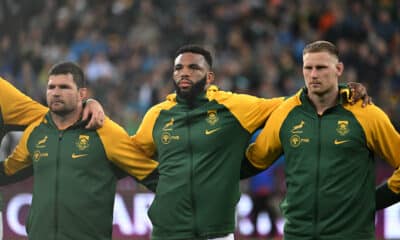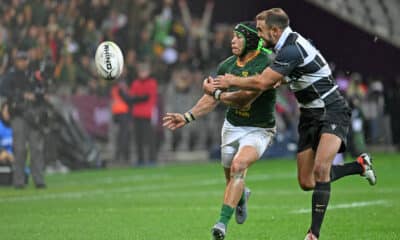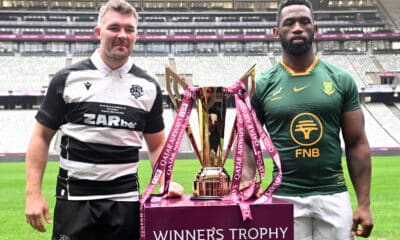
Ahead of their meeting at Twickenham on Saturday, Quintin van Jaarsveld highlights five of the most significant showdowns between South Africa and England in the professional era.
All Good Things Must Come to an End
The Springboks rocked up to Twickenham at the end of the 1998 season on a world record-equalling 17-match winning streak under Nick Mallett. The men in green and gold had won their maiden Tri-Nations title earlier in the year and were looking to seal a Grand Slam following comfortable wins over Wales, Scotland, and Ireland. Clive Woodward’s charges had other ideas.
When wing Pieter Rossouw went over for an early try, which fullback Percy Montgomery converted, it looked like business as usual for the surging Springboks, but England replied with wing Dan Luger knocking Mike Catt’s crosskick to Jeremy Guscott to grab and score. Matt Dawson, handed the goal-kicking duties after his halfback partner Catt’s wayward boot cost England victory over the Wallabies, added the conversion and it remained 7-all at half-time.
The England scrum-half slotted two penalty goals in the second half while Montgomery missed the two shots he had a goal. Down 13-7, the desperate Springboks threatened to pull off a Hail Mary in the dying moments as they produced a coast-to-coast counter-attack only to be denied by Luger, who intercepted the last pass intended for Stefan Terblanche.
With that, Lawrence Dallaglio-led England ended South Africa’s 15-month unbeaten run and registered their first win over a Southern Hemisphere side in over three years.
De Beer’s Drops In
The next encounter between the two nations came the following year and turned into the Jannie de Beer show as the Springbok flyhalf slotted a world record five drop-goals to sink England in their World Cup quarterfinal showdown at the Stade de France.
After a tense first half, it was anyone’s game as the sides returned for the second half with the Springboks leading 16-12. Then came De Beer’s heroics, the likes of which had never been seen before (no-one had ever kicked more than three drop-goals in a single game) or since.
A stand-in for injured first-choice No.10 Henry Honiball, the Free Stater unleashed an aerial assault on a stunned England with military precision. De Beer put on a 31-minute masterclass in the art of drop-goals as he booted the English out of the World Cup, and they weren’t gimmes either.
He didn’t miss a single kick at goal on that perfect day in Paris, adding five penalty goals and two conversions to his five drop-goals as he racked up a then-Springbok record 34-point haul in the 44-21 win.
Whitewash
The same venue served as the cathedral for arguably the most clinical performance in Springbok history. Firing on all cylinders, the ultra-focused men in green and gold romped to a record 36-0 rout over the defending champions in their virtual Pool A decider at the 2007 World Cup.
Fourie du Preez painted his Mona Lisa on the day, producing a masterclass that’s widely considered as the greatest scrumhalf showing in World Cup history and one of the best of all time. The virtuoso’s vision, decision-making, and game management – all the qualities that made him the consensus best No.9 in the world at the time – were on display as he orchestrated England’s annihilation.
He created all three of the Springboks’ tries – flyer JP Pietersen scoring a double and flank Juan Smith running in the other – and bossed the game as a true general. Making it all the more impressive was the fact that Du Preez had had very little game time heading into the tournament having missed most of the Super Rugby season through injury.
Laser accurate all tournament, fullback Percy Montgomery was perfect off the tee, converting all three tries and adding four penalty goals, with prodigy Frans Steyn also slotting a three-pointer in the flawless victory.
A Golden Night in Paris
When the teams met in the final just over a month later, yet again at the Stade de France, it was a completely different story than the pool match pummelling. The Springboks held a 9-3 lead in a tense and tightly contested clash when the drama kicked into top gear just after half-time.
Determined to strike first in the second half, the defending champions came storming out of the gate. Eventual Man of the Match Victor Matfield made a try-saving tackle on outside center Matthew Tait, but John Smit and company weren’t off the hook.
The quick recycled ball was shipped blind to Mark Cueto, who went over in the corner. However, Danie Rossouw had gotten a hand on the left wing and replays showed that the ever-present eighth man had made just enough contact to nudge Cueto’s left foot into touch before he grounded the ball. Australian TMO Stuart Dickinson ruled as such and the try was disallowed.
There were special heroics from Montgomery as well. The blonde-locked No.15 showed the heart of a champion as he played the last 45 minutes of the match with torn knee ligaments and kicked two of his four penalty goals during that time – with one functional leg.
A long-range penalty goal by young Frans Steyn, playing at center, gave South Africa a nine-point cushion and they clinically closed out the game to clinch a 15-6 win and return to the summit of the global game.
Big in Japan
History repeated itself 12 years later when the two nations once again faced off in the World Cup final. A Springbok side revived by Rassie Erasmus produced a complete performance for the ages to secure South Africa’s third World Cup title in style in Yokohama.
Best described as beautiful brutality, they dominated England upfront and capitalized out wide, scoring two electrifying tries through wings Makazole Mapimpi and Cheslin Kolbe, with flyhalf Handré Pollard scoring 22 points as the Springbok class of 2019 carved out their unique place in history.
The 32-12 triumph was the most convincing in Springbok history, dwarfing the 15-12 and 15-6 wins over the All Blacks and England in the 1995 and 2007 deciders respectively. It also saw South Africa become the first team ever to lose a pool match and go on to clinch the crown and more significantly, saw Siya Kolisi become the first black captain in history to lift the Webb Ellis Cup.

















